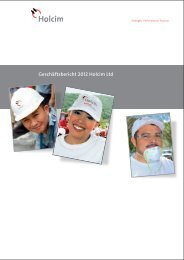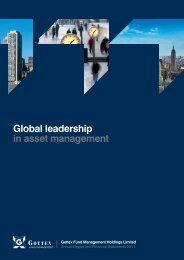Transocean Proxy Statement and 2010 Annual Report
Transocean Proxy Statement and 2010 Annual Report
Transocean Proxy Statement and 2010 Annual Report
Create successful ePaper yourself
Turn your PDF publications into a flip-book with our unique Google optimized e-Paper software.
Swiss Tax Consequences to Shareholders of <strong>Transocean</strong><br />
The tax consequences discussed below are not a complete analysis or listing of all the possible tax consequences that may be<br />
relevant to shareholders of <strong>Transocean</strong>. Shareholders should consult their own tax advisors in respect of the tax consequences related to<br />
receipt, ownership, purchase or sale or other disposition of our shares <strong>and</strong> the procedures for claiming a refund of withholding tax.<br />
Swiss Income Tax on Dividends <strong>and</strong> Similar Distributions<br />
A non-Swiss holder will not be subject to Swiss income taxes on dividend income <strong>and</strong> similar distributions in respect of our<br />
shares, unless the shares are attributable to a permanent establishment or a fixed place of business maintained in Switzerl<strong>and</strong> by such<br />
non-Swiss holder. However, dividends <strong>and</strong> similar distributions are subject to Swiss withholding tax”, subject to certain exceptions. See<br />
“—Swiss Withholding Tax—Distributions to Shareholders” <strong>and</strong> “—Exemption from Swiss Withholding Tax—Distributions to Shareholders.”<br />
Swiss Wealth Tax<br />
A non-Swiss holder will not be subject to Swiss wealth taxes unless the holder’s shares are attributable to a permanent<br />
establishment or a fixed place of business maintained in Switzerl<strong>and</strong> by such non-Swiss holder.<br />
Swiss Capital Gains Tax upon Disposal of Shares<br />
A non-Swiss holder will not be subject to Swiss income taxes for capital gains unless the holder’s shares are attributable to a<br />
permanent establishment or a fixed place of business maintained in Switzerl<strong>and</strong> by such non-Swiss holder. In such case, the non-Swiss<br />
holder is required to recognize capital gains or losses on the sale of such shares, which will be subject to cantonal, communal <strong>and</strong> federal<br />
income tax.<br />
Swiss Withholding Tax—Distributions to Shareholders<br />
A Swiss withholding tax of 35 percent is due on dividends <strong>and</strong> similar distributions to our shareholders from us, regardless of the<br />
place of residency of the shareholder (subject to the exceptions discussed under “—Exemption from Swiss Withholding Tax—Distributions<br />
to Shareholders” below). We will be required to withhold at such rate <strong>and</strong> remit on a net basis any payments made to a holder of our<br />
shares <strong>and</strong> pay such withheld amounts to the Swiss federal tax authorities. See “—Refund of Swiss Withholding Tax on Dividends <strong>and</strong><br />
Other Distributions.”<br />
Exemption from Swiss Withholding Tax—Distributions to Shareholders<br />
Distributions to shareholders in relation to a reduction of par value are exempt from Swiss withholding tax. Since January 1,<br />
2011, distributions to shareholders out of qualifying additional paid-in capital for Swiss statutory purposes are also exempt from the Swiss<br />
withholding tax. On December 31, <strong>2010</strong>, the aggregate amount of par value <strong>and</strong> qualifying additional paid-in capital of our outst<strong>and</strong>ing<br />
shares was 5.0 billion Swiss francs <strong>and</strong> 11.4 billion Swiss francs, respectively (which is equivalent to approximately U.S. $5.4 billion <strong>and</strong><br />
U.S. $12.3 billion, respectively, at an exchange rate as of the close of trading on December 31, <strong>2010</strong> of U.S. $1.00 to 0.93 Swiss francs.)<br />
Consequently, we expect that a substantial amount of any potential future distributions may be exempt from Swiss withholding tax.<br />
Repurchases of Shares<br />
Repurchases of shares for the purposes of capital reduction are treated as a partial liquidation subject to the 35 percent Swiss<br />
withholding tax. However, for shares repurchased for capital reduction, the portion of the repurchase price attributable to the par value of<br />
the shares repurchased will not be subject to the Swiss withholding tax. Since January 1, 2011, the portion of the repurchase price that is<br />
according to Swiss tax law <strong>and</strong> practice attributable to the qualifying additional paid-in capital for Swiss statutory reporting purposes of the<br />
shares repurchased will also not be subject to the Swiss withholding tax. We would be required to withhold at such rate the tax from the<br />
difference between the repurchase price <strong>and</strong> the related amount of par value <strong>and</strong>, since January 2011, the related amount of qualifying<br />
additional paid-in capital. We would be required to remit on a net basis the purchase price with the Swiss withholding tax deducted to a<br />
holder of our shares <strong>and</strong> pay the withholding tax to the Swiss federal tax authorities.<br />
With respect to the refund of Swiss withholding tax from the repurchase of shares, see “—Refund of Swiss Withholding Tax on<br />
Dividends <strong>and</strong> Other Distributions” below.<br />
In most instances, Swiss companies listed on the SIX carry out share repurchase programs through a second trading line on the<br />
SIX. Swiss institutional investors typically purchase shares from shareholders on the open market <strong>and</strong> then sell the shares on the second<br />
trading line back to the company. The Swiss institutional investors are generally able to receive a full refund of the withholding tax. Due<br />
to, among other things, the time delay between the sale to the company <strong>and</strong> the institutional investors’ receipt of the refund, the price<br />
companies pay to repurchase their shares has historically been slightly higher (but less than one percent) than the price of such<br />
companies’ shares in ordinary trading on the SIX first trading line. Effective April 20, <strong>2010</strong>, we listed our shares on the SIX. We may<br />
repurchase our shares from institutional investors who are generally able to receive a full refund of the Swiss withholding tax via a second<br />
trading line on the SIX. There may not be sufficient liquidity in our shares on the SIX to repurchase the amount of shares that we would<br />
like to repurchase using the second trading line on the SIX. In relation to the U.S. market, we may therefore repurchase such shares using<br />
an alternative procedure pursuant to which we repurchase our shares via a "virtual second trading line" from market players (in particular,<br />
banks <strong>and</strong> institutional investors) who are generally entitled to receive a full refund of the Swiss withholding tax. Currently, our ability to<br />
use the “virtual second trading line” will be limited to the share repurchase program currently approved by our shareholders, <strong>and</strong> any use of<br />
AR-34

















